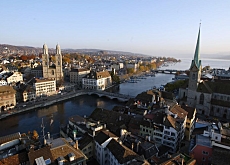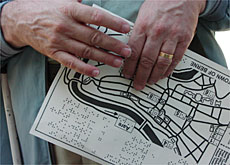New city tours speak to the deaf

Zurich Tourism has become the first Swiss business to be given lessons on how to communicate clearly with the hard of hearing.
swissinfo accompanied one of the first groups to take a tour for the hearing impaired around the Old Town of Switzerland’s biggest – and loudest – city.
“Let’s move on,” says Peter Ern, our tour guide, halfway through an explanation of why Zurich’s Rennweg is called Rennweg. He waves us down a side alley.
By way of explanation, Ern points to the ringing bells of the nearby Augustinerkirche, one of half a dozen churches within one square mile in Zurich’s Old Town.
A few moments later we arrive outside the quiet Schipfe restaurant on the River Limmat’s left bank. Ern carefully positions himself facing the sun and explains that background noise is one of the biggest problems for hearing-impaired people.
Mutual understanding
Ern is one of 30 tour guides from Zurich Tourism who went on a course in April given by pro audito, the Zurich association for people with hearing difficulties.
“Pro audito’s goal is to improve conversation and mutual understanding between people with good hearing and people whose hearing is not so good,” says Doris Kurath-Büchi, head of pro audito’s education service and initiator of the project with Zurich Tourism.
“The problem isn’t a lack of assistance for hearing-impaired people – what’s lacking is information for people with normal hearing. That is what this project is all about.”
The pro audito course for tour guides and counter staff did not involve sign language. Instead it focused on commonsense practical advice for people with normal hearing, such as speaking clearly and ensuring you face the person you’re talking to.
Staff will now tell groups that guides have been trained, and it is then up to individuals to let the guide know – by cupping their ear for example – that they are hard of hearing.
Invisible disability
“It’s an excellent idea because many people who are hard of hearing simply don’t go on tours because they get stuck at the back of a large group and can’t follow what’s being said,” says Mrs Blaser, a hearing-impaired tour aficionado.
“I love tours – the history, the culture – and I elbow my way to the front and let the guide know I have problems hearing. But a lot of people don’t have that self-confidence. They need to speak up otherwise no one will ever know.”
Ern agrees: “A lot of hearing-impaired people give up when they don’t understand something instead of asking. And because I often can’t tell if someone is deaf or not – unlike if they are blind – I don’t know that they haven’t understood.”
“The fact is that reading lips and concentrating on what is being said is tiring,” says Mrs Vollenweider, another member of the group. “It takes time and energy to process information – sometimes you just need a rest.”
Loud and clear
Ern has been a guide in Zurich for 24 years and this is his second tour for hearing-impaired people.
“I like the idea of bringing hearing and hearing-impaired people together and I like doing it – I have a clear voice and I use my hands a lot when I speak anyway.”
“Peter is very good,” says Vollenweider. “He has a very expressive voice – not everyone does. A clear voice is absolutely essential.”
Ern stresses that the tours are for people with impaired hearing, not those who are profoundly deaf.
“I don’t sign – none of the guides do,” he says. “Signing is generally for everyday topics and history is quite hard to sign.
“For example, one of the guild houses in Zurich used to be called the Horny Monk – it’s a great story but not easy to tell in sign language!”
Route selection
Stopping in the secluded Hirschenplatz, Ern points to a mural on the side of a house.
“I try to go to quieter places – interesting backstreets for example. Also colourful murals and writing on ancient walls are obviously popular with people with hearing difficulties. Visual is good.”
“I generally don’t change my route, but it depends what the group wants to see.”
Blaser says that she regularly goes on normal tours but avoids those in the evening as it’s harder to read lips and see faces.
“Direct communication and eye contact are really important,” she says. “Otherwise you think ‘Is he talking to me or not?’”
Vollenweider nods. “I remember one evening we went somewhere so dark that my son had to find some candles and hold them in front of his face!”
Sound success
“We’ve had excellent feedback,” says pro audito’s Kurath-Büchi. “People with hearing difficulties call me saying ‘It’s great – it’s not just people with hearing difficulties who are having to learn’.”
The project has been such a success that pro audito and Zurich Tourism are working with tourism offices in other Swiss cities, including Bern, Baden, Lucerne and St Gallen, and hope to launch more tours this summer.
And the etymology of Rennweg? Some people think it comes from the German word for “to run” and refers to the route messengers used to sprint down with news for the Roman caretaker at Lindenhof in the second and third centuries.
The more likely explanation however is that it refers to the main way in and out of an old town.
Key facts
Advice for hearing people (pro audito):
Speak clearly, not too quickly and at a normal volume.
Make sure your face is clearly visible.
Maintain eye contact.
Only one person should speak at a time.
Avoid loud and/or dark places.
Ensure people who are hard of hearing have understood everything correctly – especially when arranging meetings.
Avoid long conversations and include occasional breaks.
Be patient.
600,000 Swiss people have hearing difficulties – 40,000 in Zurich alone.
A two-hour tour with Zurich Tourism costs around SFr20 ($16), or half that with a Zurich Card.

In compliance with the JTI standards
More: SWI swissinfo.ch certified by the Journalism Trust Initiative


You can find an overview of ongoing debates with our journalists here. Please join us!
If you want to start a conversation about a topic raised in this article or want to report factual errors, email us at english@swissinfo.ch.